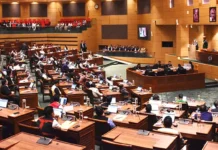[ Junroi Mamai ]
CHANGLANG, 9 Jul: The Changlang district administration’s recent initiative to streamline the functioning of private drug de-addiction and rehabilitation centres across the district is commendable, but it has also the potential to disrupt the overall ongoing rehabilitation and treatment of the hundreds of recovering patients.
As per the recent decision of the district administration, all unregistered privately-run drug de-addiction and rehabilitation centres will face closure if they fail to get registered. All owners of the unregistered privately-run drug de-addiction and rehabilitation centres have been granted a 30-day extension in order to comply with the district administration’s order.
Changlang district has a total of 19 private rehabilitation centres, of which around four are currently defunct. The growing number of privately-run drug de-addiction and rehabilitation centres is a concern, especially if they are not properly registered and do not function as per the government’s strictly laid-down guidelines. However, there is only one government registered drug de-addiction centre in the entire district, located in Bordumsa, which clearly cannot accommodate the huge number of patients in various other parts of the district.
Changlang is among the eight worst drug abuse-affected districts in the state. The rest being Tirap, Longding, Namsai, Lohit, Lower Dibang Valley, Upper Siang, Anjaw and West Kameng.
Given the rising number of patients and lack of government-run drug de-addiction and rehabilitation centres, a number of private drug de-addiction and rehabilitation centres have opened up in recent years in different parts of the district. On the other hand, the only available government intervention is at the Changlang district hospital, which is an addiction treatment facility (ATF) being coordinated nationally by the National Drug Dependence Treatment Centre (NDDTC), AIIMS, New Delhi, under the Nasha Mukt Bharat Abhiyan. The ATF has a nodal officer along with four staffers (one counsellor, a doctor, a nurse and a data operator) and provides only outpatient department (OPD) treatment without any accommodation facility. Also, one must take into account the fact that the district hospital has been facing a shortage of doctors for many years. There are only five doctors posted in the district hospital presently.
In such a scenario, patients have only private drug de-addiction and rehabilitation centres to depend upon, especially poor rural patients who do not have the means to avail treatment elsewhere.
On the issue of registration, the owners of some of the private de-addiction and rehabilitation centres have come forward with their grievances, saying that the registration process has become a lot more complicated with new sets of guidelines issued by the government.
“We want to get our centres registered as per the guidelines but there is a lot of ambiguity surrounding the registration process. The officials have no clue about the overall process and hence are unable to properly guide us through. One official tells us to write to the Department of SJETA directly while others suggest we place a representation to the director of health services instead. We are still clueless,” said one private de-addiction and rehabilitation centre owner on condition of anonymity.
Another de-addiction centre owner stated that newly opened small capacity de-addiction and rehabilitation centres will not be able to fulfil a number of criteria mentioned in the new standard operating procedures (SOP) 2024-25, issued by the Directorate of Health Services. “According to the new SOP, de-addiction and rehabilitation centres will have to appoint a specified number of doctors, clinical psychologists, therapists, nurses, counsellors etc, at the centres. My de-addiction centre is a small building located in a remote rural area having a capacity of housing only 24 people; most of them belong to poor rural families and are in dire need of treatment and care. I have kept the monthly fees nominal, considering their financial situation; sometimes I even provide them free treatment at my centre because I know their parents are helpless and cannot pay our monthly fee. How can I afford to appoint regular doctors, clinical psychologists, therapists, nurses, etc, and pay their honorariums in such a situation?” the owner questioned.
One de-addiction centre owner was concerned about the patients who are currently undergoing treatment at his centre. “What will happen to them? Where will they go if the centre gets closed? Most of us (private de-addiction and rehabilitation centre owners) are recovered addicts and we understand the plight of drug-affected poor families and want to continue our work. We request the government to take all these factors into consideration before taking any decision that may derail the whole rehabilitation process of hundreds of poor patients,” he appealed.




